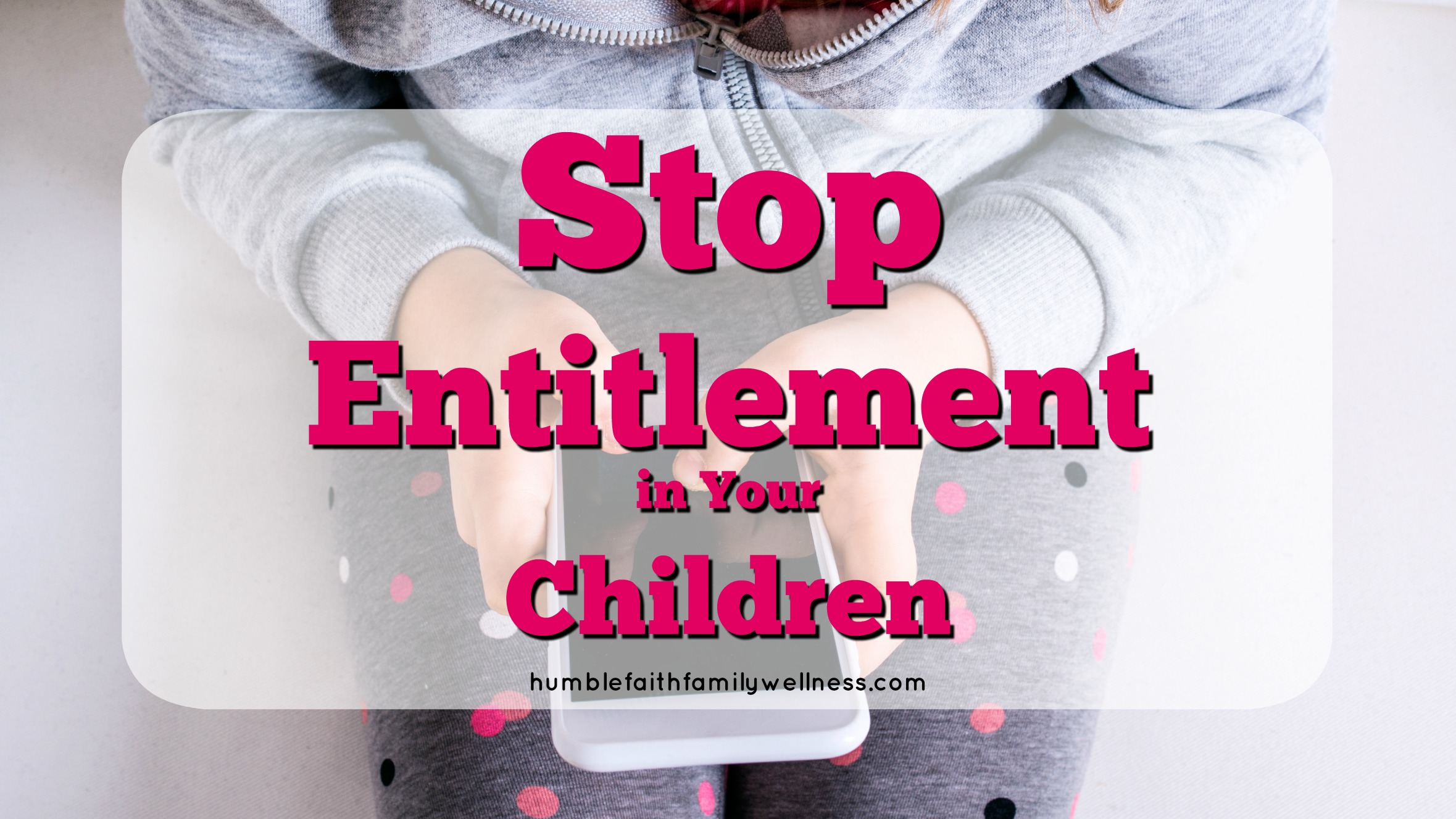
This post contains affiliates. The links come at no extra cost to you but do provide me a small commission if you use them.
How to Stop Entitlement in Your Children
As a Christian mental health therapist and a mom of two, entitlement is a topic that I discuss often!
The definition of entitlement is the fact of having a right to something. So then a sense of entitlement is the belief that one is inherently deserving of privileges or special treatment.
As a whole, our society has shifted to an entitlement mentality. The result has then become adults and children who have terrible work ethics. They also struggle with responsibility and maturity. Plus, a poor understanding of finances and money management. In reality, they’re skill level is not much higher than an infant or toddler demanding things.
Harsh. I know.
But I see my clients struggling tremendously. They either do what they can to maintain an entitlement attitude which doesn’t benefit them. Or they have to learn a crash course in responsibility because their relationships are not going well and/or their finances are in shambles.
This is not what we want for our children!
[ctt template=”9″ link=”r7cJE” via=”yes” ]We don’t want our children to have to learn a crash course in responsibility because their relationships are not going well and/or their finances are in shambles. Let’s stop entitlement in our children![/ctt]
So below are tips and tools to use to teach your children to avoid a sense of entitlement!

Needs versus Wants
Exodus 16:21 Each morning everyone gathered as much as they needed, and when the sun grew hot, it melted away.
The definition of need is a physiological or psychological requirement for the well-being of an organism. For a human that is food, water, shelter, and clothing.
The definition of want is to have a strong desire for or to have an inclination to.
To help teach the difference between need and want with my young clients, we will make a chart with two columns. I have the child list of the needs in his life and then all of his wants. When the child comes up with something they believe is a need but is actually a want, I ask, “What was life like before you had…?” “Were you able to survive?” The answer is always “yes” so we put it under the want column. The children are usually a bit dismayed by how little the “needs” category is in comparison to their “wants”.
Another powerful example of need versus want that I have recommended families do is to look up the type of food and amount of food that a third-world country consumes in a day. Then for one Saturday or Sunday I tell the family to replicate that amount in their home.
I have also recommended “no electronics” for a week for the whole family to abide by.
There are multiple other examples and experiments that can be done within the home so teach (and remind us parents) the difference between needs and wants!
Teach the Concept of Money
Luke 14:28 Suppose one of you wants to build a tower. Won’t you first sit down and estimate the cost to see if you have enough money to complete it?
If a child doesn’t understand the concept of money it is then understandable for them to ask for multiple items in the toy section, clothing section or junk food aisle. They don’t get how much money the items actually are in reference to how long it might take for you and/or them to make that money working. They also then don’t understand the priorities of money – tithing, bills, food, etc, then extras!
My husband and I bought Financial Peace Jr. for our son. Our daughter is a little young but we’ll start it with her soon, too. I’ve recommended it to my clients as well. It’s great at teaching the importance of tithing as well as paying for “needs” first with wants being last. It also talks about the importance of saving and only buying the items you can afford.


Chores
1 Corinthians 15:58 Therefore, my dear brothers and sisters, stand firm. Let nothing move you. Always give yourselves fully to the work of the Lord, because you know that your labor in the Lord is not in vain.
Chores are important for our children to complete to help them understand responsibility. There are also two kinds of chores that both serve a purpose.
Obligatory Chores
Obligatory chores are the jobs and tasks that are expected of your children just simply because they are a member of the family. Every family may have a different opinion as to what they put on their child’s obligatory list. Our kids (age 8 and 5) are required to make their beds (with help), put their clothes in their hamper, take their dirty clothes to the laundry room on laundry day, help sweep, help vacuum, help unload and load the dishwasher, help set and clear the table, help clean bathrooms, pick up toys and keep their rooms clean(-ish).
In our family we use these Melissa and Doug responsibility charts. We have two, one for each child. They hang on the wall on our staircase. The chart has pre-made chores but also empty magnets to be able to add in your own. Some of the magnets are also focused on manners and/or social skills. Again, these are chores our children are just expected to do. We may set up or designate when they need to complete the chore and on what days. It’s also important that chores are appropriate for your children based upon their developmental ability and age.
Paid Chores
Paid chores are then jobs and tasks that your children can choose to do to earn money. These are jobs that someone has to do but aren’t required for the house to run smoothly. For example, the dishes have to get done or you will eventually run out of clean dishes which is why dishes are part of the obligatory list. But, picking up dog poop is something that needs to get done but not imperative.
It is recommended to make paid chores a choice because your child is going to need to make the choice to work when they are older. The natural consequence of working is having money. Versus if you are trying to force your child to do paid chores, it becomes difficult to know if they are completing the job because they don’t want a negative consequence or because they are choosing responsibility and gaining the reward of getting paid.
Volunteer
Proverbs 11:25 A generous person will prosper; whoever refreshes others will be refreshed.
Volunteering teaches compassion and empathy for others without monetary gain. It reinforces God’s desire for us to love and care for others. Sadly, compassion and empathy is also waning as far as our society as a whole is concerned. People are much more concerned about what or how they are going to benefit from a situation rather than doing something positive just because it’s good.
Volunteering is also important for children to be in situations where other people are less fortunate than them. These situations are teaching opportunities for parents to help their children recognize the blessings they have in their life and to be thankful for all that they have.
Every city and town has volunteer opportunities at the local level at homeless shelters or food kitchens. Most churches also have compassion ministries in their area as well as missions trips. See what your town and church offers. I would recommend the whole family participate in the volunteer event to encourage conversation afterwards.
Tell Your Child “No”
The entire book of Job is a hard and beautiful lesson on handling distress and disappointment (to put it mildly)!
As parents we want our children to have more than us! We want them to be successful and happy. But we also can run the risk of aiding their sense of entitlement if we give in to their every whim! I promise you your child will survive without the latest smart phone, video game system, pair of shoes, and junk food item!
It is important for your child to experience distress and disappointment so they can learn how to handle and manage the emotion. If they don’t and they are catered to throughout the childhood they are going to have a rude awakening once they move out. This is also why so many young adults aren’t moving out! They don’t know how to take care of themselves or be responsible!
We don’t like to cause our children distress! I know! It also would be way easier to just give in and do things for my children because it would definitely be faster and likely less stressful. But I know they aren’t learning anything if I do that. It’s important that we allow our children to fail every once in a while!
I sincerely pray that this post meets you where you are today and helps you to address some of the ways that your child may be struggling with a sense of entitlement.
God Bless,
Melissa



This is SO helpful. Sharing!!!
I’m so glad you found the post helpful! Thank you for reading, commenting and sharing. God bless!
Great information! There’s a lot of pointing blame at Millenials, which gets tiring because I’m a Millenial. I served in the military for 13 years, paid for my own college education, and started my own business. The problem, I believe, is how most Millenials were raised- to have things handed to them because their parents wanted more for them than they had as a child. As a new parent, I sympathize with that mentality, but I wasn’t raised like that and so I hope to not raise my child to feel entitled. Thanks for the great tips! I will definitely use them!
First, thank you for your service! I have a huge soft spot of all military members. I did my mental health internship at Offutt Air Force Base and loved it! Second, I agree. The kids are the way they are because of parenting. I truly believe it is well intended but it has major negative ramification! Thank you for stopping by! God Bless!
I love this! I saw an entitlement mentality in the majority of Americans when I moved here to the U.S. from Guatemala. I was surprised that they had so much and felt entitled to other people’s money when they were squandering their own.
I decided to teach my kids differently. Last year we took a Dave Ramsey course for teens, and all of it made perfect sense to my kids, because that is how we live.
It is so sad to see. I know every generation says the next one is worse but there really is a decline in responsibility and overall contentment with the children. Thank you for reading and commenting! God Bless!
These are great tips. This is something that we have struggled with with our son. All of our other kids are very successful and responsible adults, but my son has struggled with supporting himself due to his feelings of entitlement. Last summer he ended up attending a failure to launch program where they helped him learn to stand on his own two feet. I really wish that he had gotten these lessons when he was young. Parents of younger kids, don’t miss out on these tips!
We all have our own strongholds and areas of weakness that we have to work through. It sounds like your son has made headway or at least realized he needs help. All the best for him and for you! It’s hard to watch your child struggle! God Bless!
Nodding my head in agreement all the way through 🙂
We love the financial peace program and teach our boys the concepts of save some, give some, spend some. They love the kids books.
I also find myself often reminding then that needs and wants are not the same thing.
Great post!
Thank you! I work with many families that are struggling with entitlement mentalities in their children and they often wonder where to start. Thank you again for reading and commenting. God Bless!
This is so well written and practically helpful! I am bookmarking this for when I am at this stage of life.
Thank you for such kind words! We started focusing on some of these principals from a very little age. I remember paying our daughter for helping me pick up sticks when she was about two! (probably about two quarters!)
This is a great post. Entitlement ruins lives and relationships.
I absolutely agree! Thank you for reading and commenting. God Bless!
Excellent thoughts! I was raised this way and plan to raise my children this way but, as a millennial mom, it is almost something we are made to feel guilty about. Thank you for your insights!
I agree! I certainly can feel like I’m getting disapproving looks when I don’t allow my children to act in a certain way. I’m glad you enjoyed the post. God bless!
This is so important. My mother and I were just discussing this yesterday. I am baffled by how parents refuse to teach this to their children and then as adults their children are still relying on them to get them out of messes that happen in college or work!
Your tips are important things for children to learn.
I really believe parents are doing what they believe is best for their child in the moment but are failing to realize the negative ramifications as an adult. Thank you for reading and commenting! God Bless!
Great list! I love the practical ways to equip them and help them think ahead since I work weekly with college students who are getting themselves constantly into troubles or debt and then trying to hide it from their parents! Then we have to pray through the stress and lies they have lived under! They have helped me see what skills I want my kids to be able to deal with before they leave home.
Thank you Jennifer. I too see many high school and college age kids who are ill equipped at life because they weren’t taught appropriate life skills. It saddens me. Thank you for stopping by and for being a support for the college students. God bless!
I love this!! Our girls are only 3 and 7 months but it’s never too early to put some great principles in place right!? Thank you x x
Thank you for posting this!!!